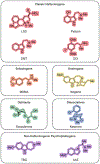Biochemical Mechanisms Underlying Psychedelic-Induced Neuroplasticity
- PMID: 35060714
- PMCID: PMC9004607
- DOI: 10.1021/acs.biochem.1c00812
Biochemical Mechanisms Underlying Psychedelic-Induced Neuroplasticity
Abstract
In addition to producing profound subjective effects following acute administration, psychedelic compounds can induce beneficial behavioral changes relevant to the treatment of neuropsychiatric disorders that last long after the compounds have been cleared from the body. One hypothesis with the potential to explain the remarkable enduring effects of psychedelics is related to their abilities to promote structural and functional neuroplasticity in the prefrontal cortex (PFC). A hallmark of many stress-related neuropsychiatric diseases, including depression, post-traumatic stress disorder (PTSD), and addiction, is the atrophy of neurons in the PFC. Psychedelics appear to be particularly effective catalysts for the growth of these key neurons, ultimately leading to restoration of synaptic connectivity in this critical brain region. Furthermore, evidence suggests that the hallucinogenic effects of psychedelics are not directly linked to their ability to promote structural and functional neuroplasticity. If we are to develop improved alternatives to psychedelics for treating neuropsychiatric diseases, we must fully characterize the molecular mechanisms that give rise to psychedelic-induced neuroplasticity. Here, I review our current understanding of the biochemical signaling pathways activated by psychedelics and related neuroplasticity-promoting molecules, with an emphasis on key unanswered questions.
Figures
References
-
- Catlow BJ; Song S; Paredes DA; Kirstein CL; Sanchez-Ramos J Effects of psilocybin on hippocampal neurogenesis and extinction of trace fear conditioning. Exp. Brain Res, 2013, 228, 481–491. - PubMed
-
- Hibicke M; Landry AN; Kramer HM; Talman ZK; Nichols CD Psychedelics, but Not Ketamine, Produce Persistent Antidepressant-like Effects in a Rodent Experimental System for the Study of Depression. ACS Chem. Neurosci 2020, 11, 864–871. - PubMed
Publication types
MeSH terms
Substances
Grants and funding
LinkOut - more resources
Full Text Sources
Other Literature Sources
Medical
Miscellaneous



